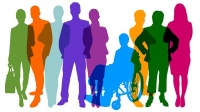Difference between revisions of "LGBTQ Economists"
| (2 intermediate revisions by the same user not shown) | |||
| Line 32: | Line 32: | ||
* [[Virgilio Barco Isakson]] | * [[Virgilio Barco Isakson]] | ||
| + | |||
| + | '''France''' | ||
| + | |||
| + | * [[Lucie Castets]] | ||
'''Germany''' | '''Germany''' | ||
| Line 53: | Line 57: | ||
* [[Niclas Berggren]] | * [[Niclas Berggren]] | ||
| + | * [[Dag Hammarskjold]] | ||
* [[Kurt Mitman]] | * [[Kurt Mitman]] | ||
| Line 90: | Line 95: | ||
* [[Government Finance Officials Who Have Identified as LGBTQ]] | * [[Government Finance Officials Who Have Identified as LGBTQ]] | ||
* [[Chief Operating Officers of Business Enterprises Who Are LGBTQ]] | * [[Chief Operating Officers of Business Enterprises Who Are LGBTQ]] | ||
| − | * [[ | + | * [[Auto and Transportation Experts Who Identify as LGBTQ]] |
==Further Reading/Research== | ==Further Reading/Research== | ||
Latest revision as of 00:37, 1 September 2024
Economics is the study of the functioning of society and its economy by way of its financial and business dealings. These dealings include employment, production, the determination of prices, impacts on social interactions, transportation, purchases, and much more. Since much of economics involves the analysis of the financial transactions between members of society, it is not surprising that issues such as bias, preferences and subjective behaviour are important to the analysis, much as they are to the LGBTQ community.
There is an ongoing debate in the profession as to whether economics is a science or an art. Without doubt, a great deal of attention and rigour is paid to statistical data from the past, what financial and business trends and relationships can be perceived from this data, and determining potential economic outcomes for the future based on this past data. The question focuses on the accuracy of predictions based on past behaviour in similar circumstances. Economics is often described as the 'dismal science' based on its often gloomy outlook for future financial and business predictions.
Though LGBTQ issues do not directly enter into the study of economics, there are many relevant issues for the community. Some examples include: looking into the effects of discriminatory behaviour to economic output and firm profitablity; the study of the wage gap which exists between heterosexual and homosexual employees; the revenues, location, and types of business within the LGBTQ economy; the health and welfare costs of AIDS; and more. It is generally agreed within the profession that there are positive economic benefits to be had from promoting non-discrimination economic behaviour, whether that be towards the LGBTQ community or other minorities.
There is no group or association which directly represents LGBTQ individuals within the profession. Whether this is based on the absence of discrimination within the profession, or whether it is because of pressure within the profession to conform to a normative lifestyle, is yet to be analyzed and discussed. However, the American Economic Association does have an Ad Hoc LGBTQ Economics Working Group to provide support for LGBTQ economists and economic research relevant to LGBTQ populations (see link below).
One of most prominent and influential economists of all time, John Maynard Keynes, was gay. A branch of economics which studies the relationship between the supply and demand for goods and services, known as Keynesian Theory, emanated from his research work. Another prominent contemporary economist who has gained great respect for her work in the study of capitalism is transgender Deirdre McCloskey, a distinguished professor at the University of Illinois in Chicago. American Mary C. Daly was appointed President of the Federal Reserve Bank of San Francisco in October 2018 after serving as the organization's director of research. Many banks and other financial institutions around the world employ economists to strategize their business activities, and several of these identify as LGBTQ.
We have been able to identify the following economists who identify as LGBTQ. Simply click on their names to read their fascinating biographies and accomplishments.
Australia
Canada
Colombia
France
Germany
Great Britain
Peru
Sweden
The Netherlands
United States
- Billur Aksoy
- Isaiah Andrews
- Lee Badgett
- Daniel Baer
- Christopher Carpenter
- Katharine Coman
- Mary C. Daly
- Elizabeth Gooch
- Tarek Alexander Hassan
- Nick Huntington-Klein
- Michael Martell
- Deirdre McCloskey
- Alyssa Schneebaum
See Also
- LGBTQ Chief Executive Officers of Business Enterprises
- Noteworthy LGBTQ Individuals in the Accounting Profession
- LGBTQ Chief Information/Technology Officers
- Human Resource Professionals Who Are LGBTQ
- Marketing Professionals Who Identify as LGBTQ
- LGBTQ Venture Capitalists and Startup Advisors
- Investment and Wealth Management and the LGBTQ Community
- LGBTQ Bankers
- The LGBTQ Presence in the Insurance Industry
- Government Finance Officials Who Have Identified as LGBTQ
- Chief Operating Officers of Business Enterprises Who Are LGBTQ
- Auto and Transportation Experts Who Identify as LGBTQ

